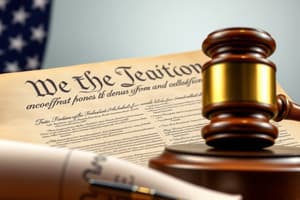Podcast
Questions and Answers
Welches Gericht in Deutschland ist für die Überprüfung der Verfassungsmäßigkeit von Gesetzen zuständig?
Welches Gericht in Deutschland ist für die Überprüfung der Verfassungsmäßigkeit von Gesetzen zuständig?
- Das Oberverwaltungsgericht
- Das Bundesverfassungsgericht (correct)
- Das Bundesverwaltungsgericht
- Der Bundesgerichtshof
Wer ist in der Regel der Leiter der größten Gruppierung im Bundestag und gleichzeitig der Regierungschef?
Wer ist in der Regel der Leiter der größten Gruppierung im Bundestag und gleichzeitig der Regierungschef?
- Der Bundeskanzler (correct)
- Der Landesvorsitzende
- Der Bundespräsident
- Der Bundesratspräsident
Welcher Zweck wird durch die Bundesrat-Vertretung der Länder in der Gesetzgebung erreicht?
Welcher Zweck wird durch die Bundesrat-Vertretung der Länder in der Gesetzgebung erreicht?
- Vollständige Zentralisierung der Gesetzgebung
- Beeinflussung des Wahlergebnisses im Bundestag
- Völlige Unabhängigkeit der Länder in der Gesetzgebung
- Kontrolle der Einhaltung des Grundgesetzes bei Verabschiedung von Gesetzen (correct)
Welche Rolle spielt das Grundgesetz in Deutschland hinsichtlich fundamentaler Rechte und Freiheiten?
Welche Rolle spielt das Grundgesetz in Deutschland hinsichtlich fundamentaler Rechte und Freiheiten?
Welche Rechtssprache ist gemäß dem Grundgesetz in Deutschland rechtlich bindend?
Welche Rechtssprache ist gemäß dem Grundgesetz in Deutschland rechtlich bindend?
Was wird durch das Grundgesetz in Deutschland nicht reglementiert?
Was wird durch das Grundgesetz in Deutschland nicht reglementiert?
Welches Dokument dient als Bundesverfassung in Deutschland?
Welches Dokument dient als Bundesverfassung in Deutschland?
Wann wurde das Grundgesetz für die Bundesrepublik Deutschland verabschiedet?
Wann wurde das Grundgesetz für die Bundesrepublik Deutschland verabschiedet?
Welche Länder verwalteten die westlichen Zonen Deutschlands, in denen das Grundgesetz zunächst galt?
Welche Länder verwalteten die westlichen Zonen Deutschlands, in denen das Grundgesetz zunächst galt?
Wieso wurde das Grundgesetz für die Bundesrepublik Deutschland ursprünglich als vorläufige Maßnahme angesehen?
Wieso wurde das Grundgesetz für die Bundesrepublik Deutschland ursprünglich als vorläufige Maßnahme angesehen?
Welche Verfassung wurde von den Staaten der ehemaligen DDR bei der Wiedervereinigung übernommen?
Welche Verfassung wurde von den Staaten der ehemaligen DDR bei der Wiedervereinigung übernommen?
Welches System etabliert das Grundgesetz für die Bundesrepublik Deutschland?
Welches System etabliert das Grundgesetz für die Bundesrepublik Deutschland?
Flashcards are hidden until you start studying
Study Notes
Constitutional Law in Germany: The Basic Law for the Federal Republic of Germany
The constitutional law of Germany is based on the Basic Law for the Federal Republic of Germany (German: Grundgesetz für die Bundesrepublik Deutschland, or GG), which serves as the country's federal constitution. Adopted in 1949, the Basic Law was initially intended as a provisional measure to govern the German states in the western zones of occupation administered by the United States, Great Britain, and France. It was later amended several times and has remained the governing document for Germany, both before and after its reunification in 1990.
Basic Law's Provisional Status and Reunification
The drafters of the Basic Law assumed that it would serve as an interim measure until a permanent constitution could be adopted for the whole of Germany. However, when reunification occurred, the states that comprised the German Democratic Republic (East Germany) acceded to the Federal Republic and adopted the Basic Law as their governing document.
The Basic Law has been amended throughout its existence, both before and after reunification. It has never been replaced, despite its original intention as an interim measure.
Structure and Application
The Basic Law establishes Germany as a parliamentary democracy with a separation of powers into executive, legislative, and judicial branches. The executive branch consists of the largely ceremonial Federal President as head of state and the Federal Chancellor, the head of government, who is typically the leader of the largest grouping in the Bundestag.
The legislative branch is represented by the Bundestag, elected directly through a mixed-member proportional representation system. The German Länder participate in legislation through the Bundesrat, reflecting Germany's federal structure.
The judicial branch is headed by the Federal Constitutional Court, which oversees the constitutionality of laws.
Key Provisions and Amendments
The Basic Law provides for the protection of fundamental rights and freedoms, including freedom of movement, and allows for the restriction of these rights in certain circumstances. It also outlines the legislative powers of the Länder, the structure of Land authorities, and Land administrative procedures, which are subject to the Bundesrat's prime consideration in the formation of the political will of the Federation.
The Basic Law has been amended to implement constitutional changes agreed upon in the Two Plus Four Treaty and other agreements related to Germany's reunification.
Legal Status and Scope
The Basic Law applies to the entire German people, including the Länder and the Federation. It is available in both the original German and English translation, and its terms are legally binding in the German language.
In conclusion, the Basic Law for the Federal Republic of Germany serves as the constitution of Germany, providing the framework for the country's parliamentary democracy, separation of powers, and protection of fundamental rights and freedoms.
Studying That Suits You
Use AI to generate personalized quizzes and flashcards to suit your learning preferences.



